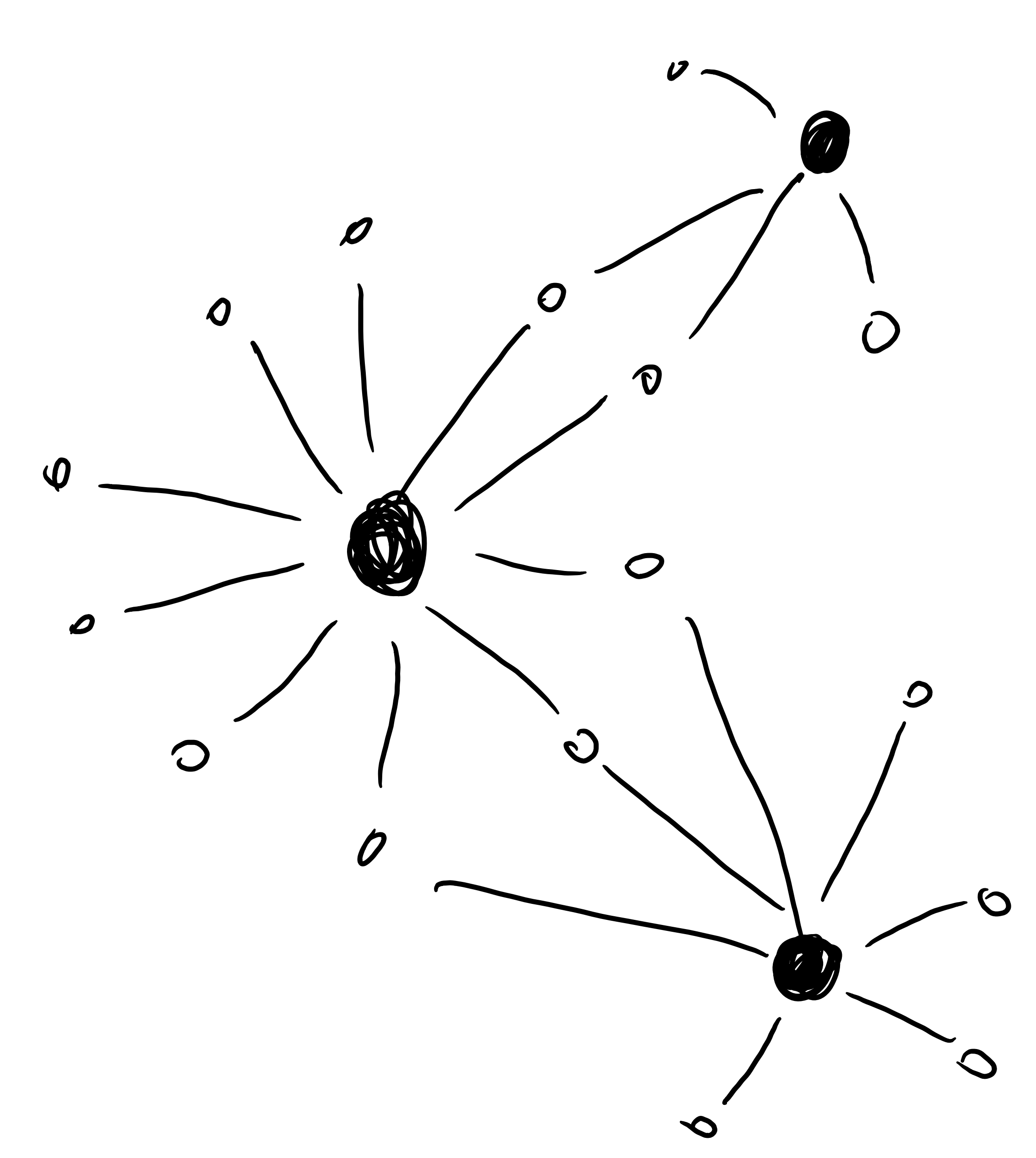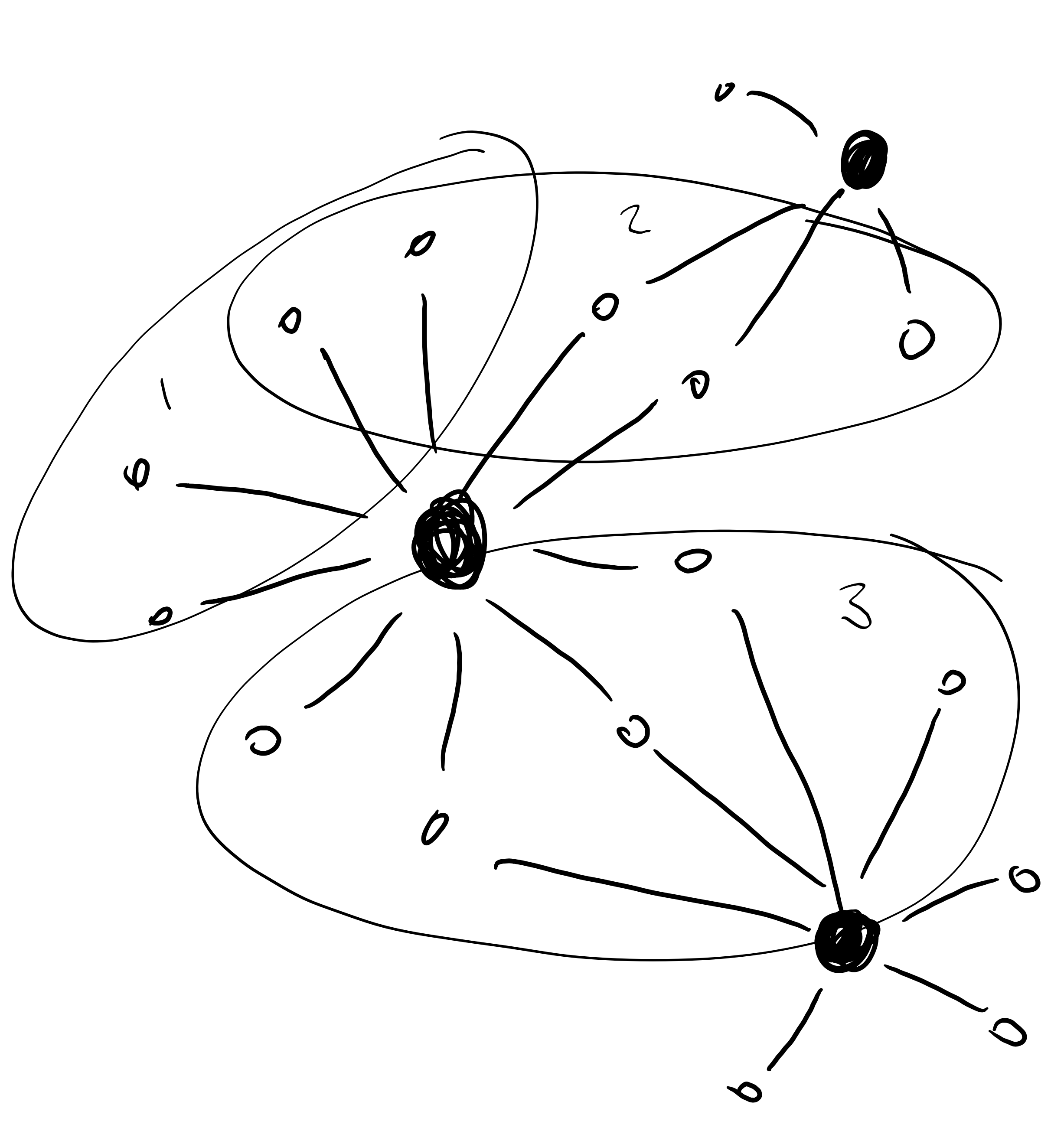I’m writing these notes on the train back from two fascinating days at SciencePo in Paris for a set of meetings jointly hosted by Datasphere Initiative, Aapti Institue and the Ostrom Workshop. Besides the simple pleasure of catching up with, or meeting in person for the first time, many of the people I’ve only seen on zoom screens for the last year years, the discussions sparked all sorts of reflections, and if I can capture just a few of them here I’ll be glad.
Doodling data communities - our alternative to atomisation?
On Thursday, a small group gathered to explore questions around the potential for shared terminology, and common governance models, across different forms of ‘data community’. Of course, a lot of the challenge was to define what a ‘data community’ might be. As our discussion progressed, various rapporteurs took to the flip-chart to try and draw out the features of data communities, their layers, and flows of data and power.
My own sketches tried to capture the issue like this.
(1) The dominant logic of the digital platforms that surround us is to create a ‘hub and spoke’ model in which they are the hub, and we’re out on the spokes.

Even social media platforms that allow us to connect with each other are, when it comes to questions of power and governance, still based on this hub and spoke model. Notice and consent approaches construct a contractual relationship between individual and platform, and even if I’m sharing, interacting or transacting with other members of the platform, with respect to the platforms power, we are atomised individuals.
(2) Individuals stand in relationship to many different platforms

(3) A data community can be said to exist when any grouping comes together to collectively make decisions or take action about data

(4) Individuals might be part of many different data communities. Communities might be nascent - existing by virtue of a shared interest and set of relationships to a source of data power, but not orgasnised or actualised.
(5) We could also extend the notion of a community of interest to include non-human actors (e.g. natural world;)
Although somewhat schematic, I hope this simple model might be useful for thinking about different forms of data community activity, from:
- A group of individuals (or organisations) coming together to develop a shared agreement on pooling data for club or public good;
- A community organiser enrolling members into a group action to challenge the governance decisions of a platform they use;
- A political actor taking their mandate from community support in order to push for policy change that uses a community/democratic process to regulate the actions of powerful platform actors.
The focus on data communities also led me to think about the other kinds of terms that might go along with ‘community’: both positive and negative. Community development; community worker; community leader; community organiser; communal rights; communal violence and so-on. In particular, I found myself coming back to the idea of community organisers when asked on the closing panel to offer a ‘Moonshot goal’ for the gathered group.
My (ad-hoc) pitch, riffing on earlier inputs from Julia Stamm, CEO of the newly launched DataTank, around creating new professions to lead the evolution of data stewardship inside organisations, and reflections from Angie Raymond, Director of Data Management and Information Governance at the Ostrom workshop, on the process of bringing together communities with data problems and solutions on the ground, was to call for work to develop 10,000 Data Leaders.
Behind this is the reflection that, for all the discussion of regulations, protocols, structures and technologies that might support data communities to develop and act, all the successful ‘data communities’ I can think of have one or two people who have taken on the task of leading, organisaing and stewarding the work. Not really (though sometimes with elements of) technical data stewardship - but deploying organisational, diplomatic, motivational and small-p political skills to bring community together, orient people to shared goals, and mobilise community.
Narratives and geopolitics
Friday’s discussions kicked off with a panel on ‘Data Governance: Beyond the Battle of the Narratives’ which touched upon a couple of narrative ‘conflicts’ to be handled.
Firstly, the panel touched on the challenges created by the (very often false) dichotomy between ‘personal’ and ‘non-personal’ data. When personal data is involved, privacy is invoked, and those seeking to promote (public good) data sharing either feel their efforts are being stymied, or reach for ever-more complex (and arguably futile or exclusionary) technical mechanisms (e.g. Privacy Enhancing Technologies) or methods of individual control. At the same time, if something is classified ‘non-personal’, then consideration of how its use might impact on people and communities tends to get left aside.
I wondered during the closing session what strategic/movement building value lies not in seeking to demarcate the space where privacy is not important, and assert ‘alternative narratives’ to those of privacy, but rather, how we might parallel the development of multi-part fields like ‘Diversity, Equity and Inclusion’, with a focus on ‘Privacy & Other Rights’ or ‘Privacy & Community Impact’ for example. Just as in DEI, a particular context may require more emphasis to be put on one element than another, a focus on ‘Privacy and Community Impacts’ may at times call for different emphasis depending where the particular affordances and risks of the data initiative/intervention being considered fall.
Secondly, the panel explored macro-level narrative differences between concepts of ‘free flow of data’ and ‘data sovereignty’ (explored in a lot more depth in Datasphere Initiative’s We Need to Talk About Data), and the sense of a set of different global ‘data governance regimes’ centred on the US, Europe, China and so-on. The discussions offered a striking reminder that often the choice of ‘data governance narrative’ is subordinate to other geopolitical pressures: as states may be trading off pressure to align with particular data governance models with getting concessions from powerful trading partners, for example. We see some of this in the current UK context, with the desire to carve out a distinctive ‘post-Brexit’ data regime driven, at least in part, by the broader (party-) politics of having a distinct agenda from Europe. As we explore how Connected by Data can contribute both to narrative change, and to policy work beyond the UK, keeping the geopolitical (appropriately) in mind is likely to be critical.
Pushing forward participatory practice
I was struck by how many people cited importance of participatory practice, and how many organisations are at an exploratory stage in this work. I’ve got a take-away task from the workshops to start making plans for our ‘design lab’ on participation: a one or two day workshop we’re hoping to hold before September to look at a practical challenge of participatory data governance, and explore shared solutions. More on that soon.
Other things
A couple of other updates from the last few weeks:
-
Connected by Data joined Datasphere Initiative as an in-kind partner. In addition to taking part in the workshop just gone, we’re looking forward to future collaboration around global policy fora, and our connected conversations series… which is soon to return as we wrap up recruiting a field building associate in the next few weeks!
-
On Tuesday we published a write-up of our second workshop on the JRF Insight Infrastructure project, which took place on 6th March. Over the next few weeks I’ll be working with Obioma to feed this into the draft stakeholder engagement strategy, thinking particular about how to build on the ‘community first’ messages coming from last week’s workshop in order to focus on the ‘insight infrastructure collaborative’ as much as ‘infrastructure as artefact’.
-
I’ve been getting plans set-up to kick off our upcoming work with IDRC and the Global Partnership on Sustainable Development Data to explore how the Global Data Barometer can be used as part of measuring data value.
-
We took forward some planning for our first design lab on narratives, working with Dan Stanley of Future Narrative Lab to start plotting out potential invite lists and workshop plans.
-
Our proposal for a workshop at the Data Justice conference in Cardiff in June was accepted, so looking forward to heading along there to learn and share some of what we’ve been exploring on different participatory data governance approaches.
